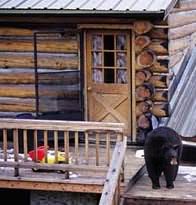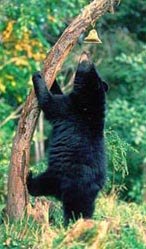|
Residential Areas
 Minimize odors and the availability of food rewards through out your yard and neighborhood. Report all residential wildlife encounters to your local wildlife management agency and police department, and notify your neighbors of the situation Minimize odors and the availability of food rewards through out your yard and neighborhood. Report all residential wildlife encounters to your local wildlife management agency and police department, and notify your neighbors of the situation
- Remove any dense brush that could provide cover for a bear or cougar and make a surprise encounter likely. Also remove brush piles that snakes may hide in.
- If a bear or other wild animal repeatedly enters your yard, look for what attractants are drawing it there and remove them.
- Put out garbage on the day of pick up, not the night before. Store in a sturdy building or place in an approved bear-resistant trash receptacle.

- Do not leave pet food out. Hang bird feeders out of a bears reach and take down during periods of high bear activity.
- Keep bar-b-ques clean and grease free. Store with livestock/pet feed and other attractants inside a sturdy building.
- Fruit trees: Pick all ripe fruit from the tree and surrounding ground.
- Compost piles may attract wildlife, especially bears. Do not put meat, fish and other pungent scraps in compost piles. Add lime to reduce odors and accelerate decomposition.
- Electric fences are an effective way to keep bears and other animals out of orchards, gardens, compost piles and beehives. Follow appropriate safety precautions.
- Never feed wildlife. Feeding marmots and deer can attract cougars. Feeding chipmunks and ground squirrels can increase the possibility of hantavirus and rabies. Feeding ducks and fish can attract alligators.
- All wildlife can be dangerous. Do not attempt to chase or harass an animal out of your yard, especially if it is a bear or alligator. Contact the appropriate authority for assistance.
- Be sure to seal holes and spaces around your home to prevent insects, snakes and rodents from entry.
Bear activity may intensify in the spring when bears are hungry and emerging from their dens, in the fall when bears are bulking up for hibernation, and during drought periods. This is due to natural foods often being scarce.
|